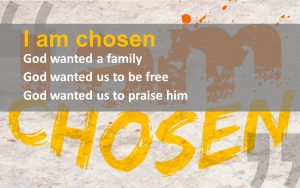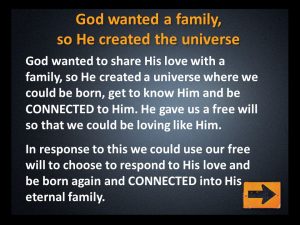
Shownotes
Wisdom-Trek / Creating a Legacy
Welcome to Day 1111 of our Wisdom-Trek, and thank you for joining me.
I am Guthrie Chamberlain, Your Guide to Wisdom
God Wanted a Family – Worldview Wednesday

Wisdom – the final frontier to true knowledge. Welcome to Wisdom-Trek where our mission is to create a legacy of wisdom, to seek out discernment and insights, and to boldly grow where few have chosen to grow before.
Hello, my friend, I am Guthrie Chamberlain, your captain on our journey to increase Wisdom and Create a Living Legacy. Thank you for joining us today as we explore wisdom on our 2nd millennium of podcasts. This is Day 1111 of our trek, and it is Worldview Wednesday. Creating a Biblical worldview is important to have a proper perspective on today’s current events.
To establish a Biblical worldview, you must also have a proper understanding of God and His Word. Last week we began a new series in which we are covering another detailed review of a book from one of today’s most prominent Hebrew Scholars Dr. Micheal S. Heiser. We are taking a deep dive and will share Dr. Heiser’s insights into the question, which is also the title of his book “What Does God Want?”
God Wanted a Family

Last week we began to explore the question “What does God want?” We discovered that the overall answer is simple. He wants you.
Before I became a believer, God was seeking me. I just didn’t know it. He is also seeking you. I know now that God sought me because it’s his nature to seek us. He’s committed to us.
How do we know these things about God? (That’s a question I’m going to ask more than once, so look for it!) Let’s start with ourselves as an analogy. It’s normal—part of our nature—to care about the things we make, especially if they required serious effort or were the result of concerted thought. We are naturally going to be angry or resentful when someone mocks, belittles, destroys, or claims as theirs something we made, achieved, or thought of first. Not feeling those things would be abnormal.
But God showed his great love for us by sending Christ to die for us while we were still sinners.
The God of the Bible shares this profile, or should I say, we share His profile. God does what he does to enjoy what He’s done. God didn’t create humanity because he lacked something. He wasn’t lonely, as though He was incomplete or needed company. God needs nothing because… well…He’s God. He created things to enjoy the work of his own hands, so to speak. And the things he cares about most are those He made to be like him, “in his own image” as the Bible says (Gen [1:26]). He is referring to you and me.
Our story—the story of why God wants us—begins with the biblical idea that God is our Maker. Although we can’t completely comprehend that, the bottom line is that we’re here because God wanted us here. God doesn’t act randomly. He acts with purpose. When He created humankind, He wasn’t trying to fill some deficiency in himself. Given the fact that He didn’t need us but still made us, there’s only one rational explanation for why He created us. God wanted us to exist in order to enjoy us (and to have us enjoy him in return).
Because God created us, the Bible refers to him as our “Father” and people from Adam onward as his children. That’s why the Bible uses the language of family to describe God and His relationship to us. That’s no coincidence.

But I’m getting a little ahead of myself. To really understand the context for the family-centered language in the Bible, we need to go back to the time before God made the earth and the human race. It may surprise you, but God wasn’t alone then, either. That’s another reason why we can be sure he didn’t create us to heal his own loneliness.
The Bible tells us that before God created us, he had already created other intelligent beings. The Bible calls them “sons of God.” We call them angels. The Old Testament book of Job tells us that the sons of God “shouted for joy” when God laid the foundations of the earth (Job 38:4-7). They were already present and watching.
Think about the phrase “sons of God.” The same Hebrew term translated “sons” can also be translated more inclusively as “children.” What does a phrase like “children of God” imply? Family!
“Children” is a term you’d use when a family is the subject of conversation. In the case of Job 38:4-7, the family is a heavenly or supernatural one. God is Father to the intelligent beings He creates in the unseen realm. At least unseen to humans, except for rare occasions.
The fact that God already had a supernatural family helps us understand his motivation for the creation of Adam and Eve, the first humans in the Genesis story. God wanted a human family in addition to his supernatural family. Incredibly, the story of Eden tells us God wanted his two families to live together in his presence. This means that, just like the angels, humans were originally created fit for the presence of God himself.
But how do we know all that? (There I go again). Let’s take a look.
The first book of the Bible, Genesis, begins with creation. God had done a lot of creating by the time the story gets to people (Adam and Eve). The story unfolds with God creating plants, insects, flying creatures, and land animals. None of those creatures was capable of having a relationship with God. They could not converse with God. They could not share their thoughts with God or express their appreciation to him. Members of a family relate to one another—they interact on an intellectual and emotional level. They form companionship bonds. As spectacular as plants and animals are, they couldn’t play the role of children. They weren’t family. That’s what God really wanted. He needed to create something like himself.
· Imagers of God
After God had filled the earth with all kinds of plants and animals, He still had work to do. God decided to fashion new creatures “in His image” and “in His likeness” (Genesis [1:27].)
The “image of God” is an important concept in the Bible. Human beings were created to be like God. Think of the “image” of God as a verb, and you’re on the right track to understanding the idea. We were created to image God, to be his imagers—to represent him.
What does it mean to image God? Genesis [1:27]-28 gives us the answer.
So God created human beings in his own image.
In the image of God he created them;
male and female he created them.
Then God blessed them and said, “Be fruitful and multiply. Fill the earth and govern it. Reign over the fish in the sea, the birds in the sky, and all the animals that scurry along the ground.”

God could have taken care of his world just fine. He’s God. Nothing is beyond his ability. But instead, God created an earthly family. His children would assume His role in managing and maintaining his creation. They would be understudies and partners. Imaging God means being God’s representation on earth. God tasked humans with doing a job he could just as well have done himself. But he wanted his children to participate. God’s business would be a family business. Eden was not merely God’s home; it was God’s home office. We were created to be God’s co-workers.
God made sure the people he made could do the job of imaging him on earth. He shared his attributes (his qualities and abilities) with them—things like intelligence and creativity. The Bible tells us that humans are a lesser version of who God is. He made us to be like him so we could participate with him as co-rulers and co-caretakers in his new world.
Imaging God is an important concept for several reasons. It gives each of us a secure, profound identity. It was God’s original desire that every human being would be his child and partner. That is how God looks at people. It’s also how we ought to think of people. God wants every one of us to consider each person a sibling. We all have the same status as imagers of God whom God wants in his family. Racism, violence, manipulation, and coercion were not part of God’s design for humanity. They are the evil result of rebellion and sin. God hates what sin has done to the people he loves. That’s something we need to remember when we think about our own moral failures and those of others.
Imaging God also gives us purpose. We have a mission. Every person, no matter how small or weak or short-lived has some role to play in someone else’s life. Every task we set our mind to that honors God and our fellow imagers becomes a spiritual calling. In God’s mind, the role of a pastor, minister, or priest is not superior to any other calling. How we live either blesses fellow imagers, reminding them of what life and harmony with God must surely be like, or curses them. What we do matters—and most of the time in small, unspectacular ways.
All of this is why Dr. Heiser answered his opening question the way he did. What does God want? He wants you. He wants a family. He wants co-workers. He wants you to know who you are and why your life has value to Him.
But we’re just getting started. There’s a lot more to the story. Life in our world—and perhaps even in our own house—doesn’t conform to God’s vision. Something happened to ruin it all. The heartache would be so great that God almost decided to give up on humanity.
That will conclude our lesson from Dr. Heiser’s book “What does God want?” for this week. Next Worldview Wednesday, we will discover that God still wanted a family, even after our rebellion. I believe you will find each Worldview Wednesday an interesting topic to consider as we build our Biblical worldview.
Tomorrow we will continue with our 3-minute humor nugget that will provide you with a bit of cheer and help you to lighten up and live a rich and satisfying life. So encourage your friends and family to join us and then come along with us tomorrow for another day of our Wisdom-Trek, Creating a Legacy.

If you would like to listen to any of our past 1110 treks or read the Wisdom Journal, they are available at Wisdom-Trek.com. I encourage you to subscribe to Wisdom-Trek on your favorite podcast player so that each day’s trek will be downloaded automatically.
Thank you for allowing me to be your guide, mentor, and most importantly, your friend as I serve you through the Wisdom-Trek podcast and journal.
As we take this trek together, let us always:
- Live Abundantly (Fully)
- Love Unconditionally
- Listen Intentionally
- Learn Continuously
- Lend to others Generously
- Lead with Integrity
- Leave a Living Legacy Each Day
I am Guthrie Chamberlain reminding you to Keep Moving Forward, Enjoy Your Journey, and Create a Great Day Everyday! See you tomorrow!